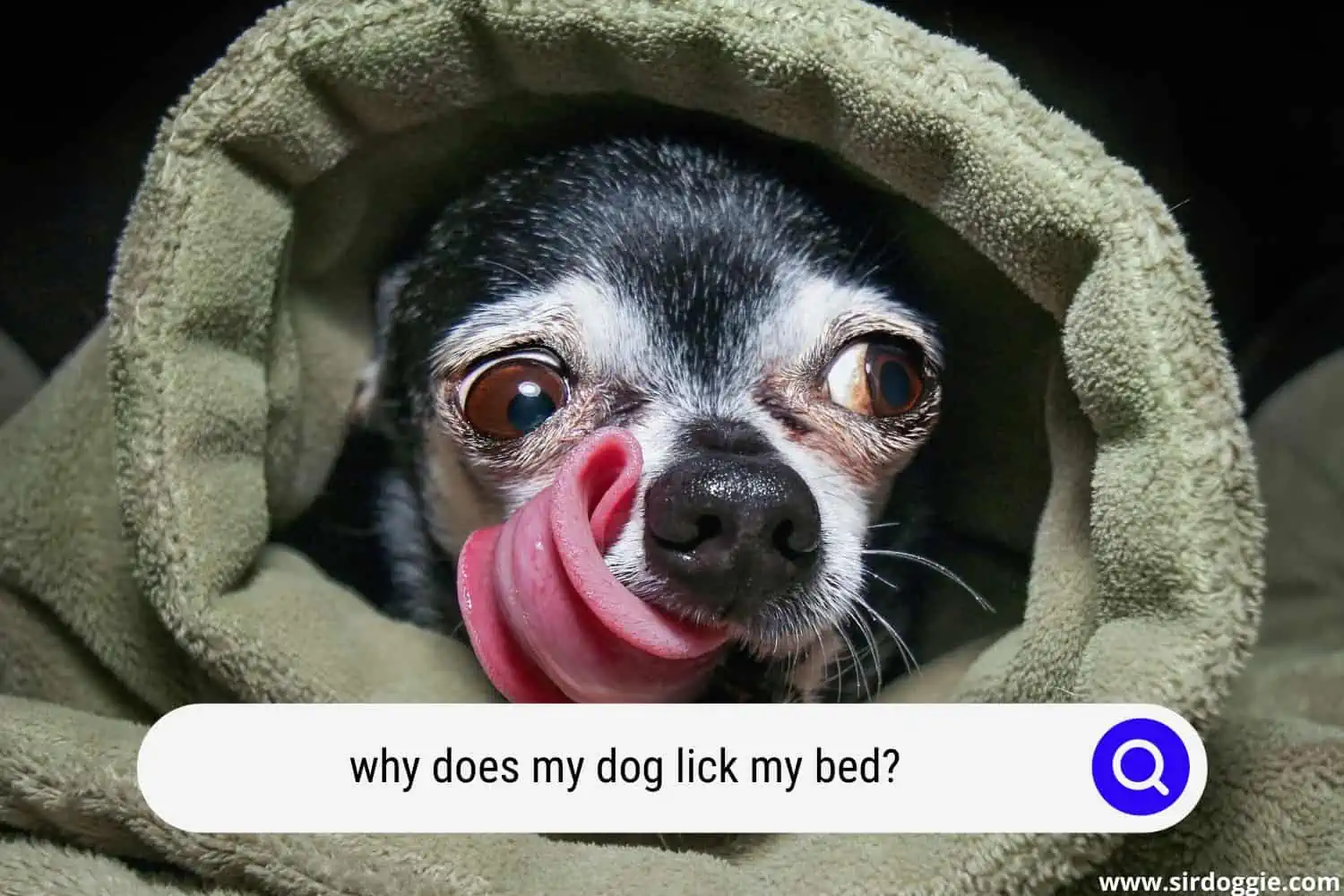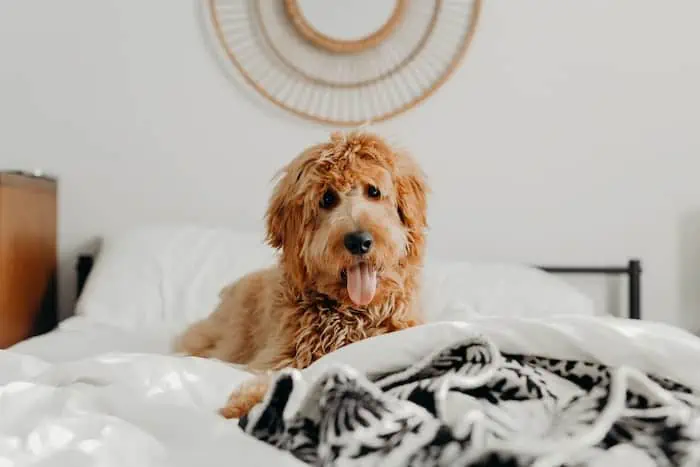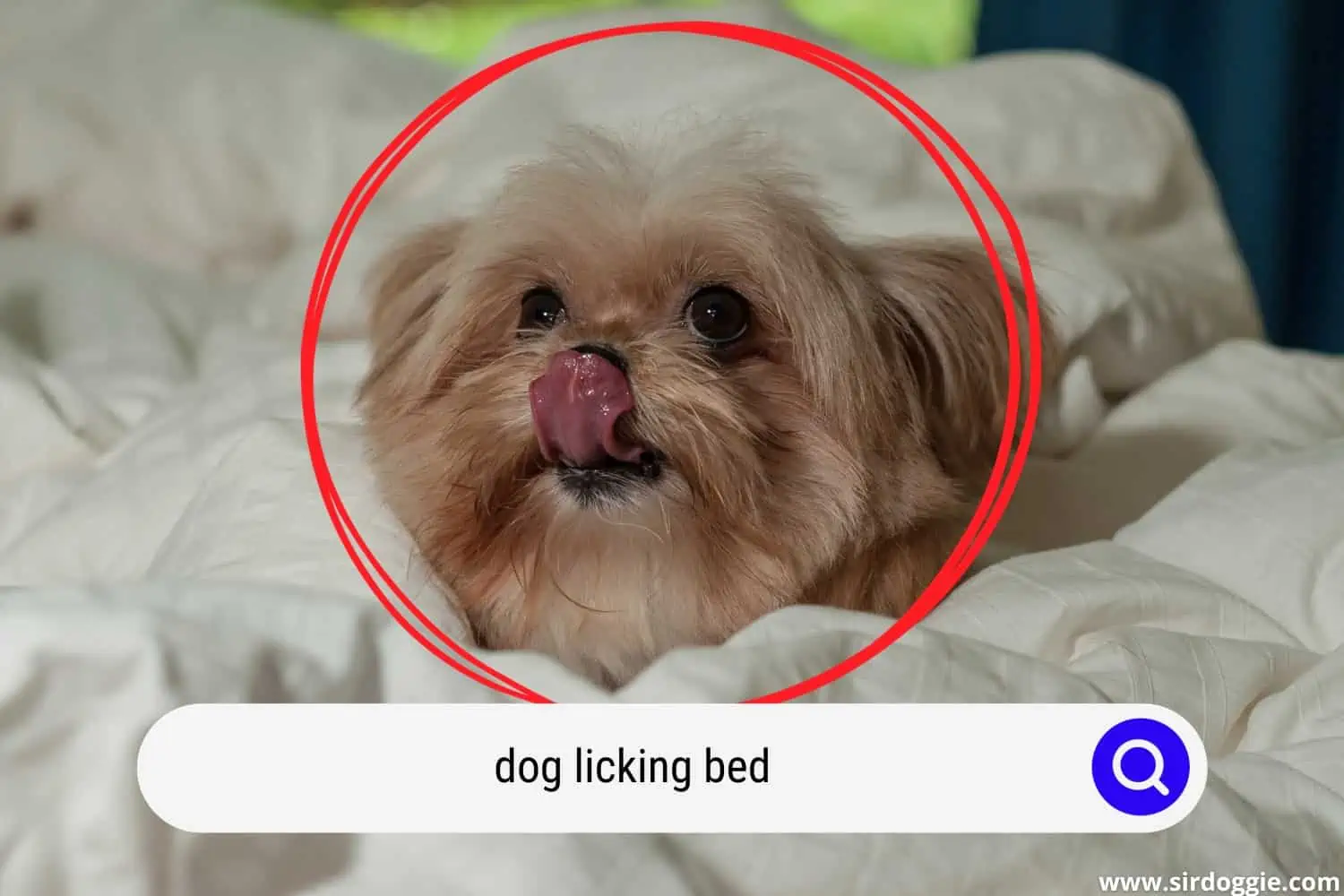Why Does My Dog Lick My Bed? (6 Reasons)
It can be amusing when a dog has a peculiar habit. Who doesn’t chuckle when your pooch makes that certain face in response to a particular noise? However, it may no longer be funny if the habit causes problems. If you have to ask yourself, “Why does my dog lick my bed?” it may be prudent to monitor closely.

A dog might lick your bed for several reasons, among them stress, anxiety, or a mental condition like obsessive-compulsive disorder (OCD). Dogs are prone to some of the same environmental and societal pressures as humans — and their brains and bodies react in response. It doesn’t always mean the habits are abnormal.
However, there are some instances when you should call a vet if your dog is excessively licking bed sheets, furniture, or other non-food items.
Dogs lick pretty much anything. They lick to groom, to test an item, to show affection, or sometimes to simply communicate nicely. They can lick our hands and faces if we get too close, or, yes, carpets, sofas, or beds.
If your dog’s licking of a particular spot is noticeably excessive — especially if you cannot seem to stop it by trying to adjust its behavior — it may be worthwhile to seek help. Here is some insight into dogs that insist on licking your bed.
Common Causes of Dog Licking
First, it’s important to note right away that licking beds does not have to indicate a serious medical condition in your dog. It can be, but often it’s just a response to common behavioral challenges like stress, anxiety, or even boredom.
Dogs and humans are both animals and as such share some characteristics. While dogs cannot talk and communicate verbally with us, they certainly can give us hints about their feelings with their actions. All that barking? Something is bothering your dog — or he or she is just very happy! Haven’t all of us whooped it up by hollering once in a while?
Here are some not-unhealthy reasons a dog might be licking your bed:
- Boredom. Dogs get bored, too, and a way to combat this is to give it more opportunities to exercise or socialize with other pooches such as at a dog park. These two behavioral changes, exercise, and socializing, are the first two things you should try to stop excessive licking of your bed.
- Stress. Did you bring a baby into the household, or even a puppy? Does a stranger now visit often? Your dog could be stressed about the change and the licking is a call for attention. See above for an easy fix: try to give it more attention for a spell and see if it helps.
- Anxiety. Dogs can get anxious about many things, like diminishing attention (see above), or when they might get fed. The same thing applies to stress: licking is a way to soothe itself in times of worry. If your pooch excessively licks your bed while you’re not there, it could even be separation anxiety.
- Over-rewarding. You might not know it, but a reward during or after the bed licking could be exacerbating the problem. Think about whether you petted or gave your dog a treat or toy associated with the bed licking.
- Feels good. Believe it or not, repeated licking releases chemicals (endorphins) that make your dog feel better. Ever self-soothe by eating something yummy? Humans may not lick everything, but indeed we do sometimes take unusual actions to stop feeling crummy. Dogs can, too.
- Just likes it. Maybe your dog just likes the taste of your bed sheets or pillowcases, or maybe just your smell around it. We can’t just ask the dog why, but it’s not out of the question that your pooch just likes to lick a certain spot. Also, remember that your sweat and dead skin cells can be salty — a taste or sensation that dogs tend to like.
Note that most animals have natural urges when their bodies are short on salt. Cows and horses in the wild are known to find plants for food with high saline content for this reason. Too much salt is unhealthy, but we all need some for certain bodily systems such as sweating. Same with dogs; when their bodies are short on salt content, they can lick items that taste salty.
However, what to watch for is when the licking of specific items becomes a real ongoing habit, threatening the health of the animal or the condition of the item licked. Aside from the annoyance of an unexpected wet spot in your bed, the dog’s licking could be an indicator of a medical condition that needs attention.
Too Much Dog Licking for Medical Reasons
If your dog does not respond to more personal attention, exercise, or general stimulation, and continues to lick your bed, there could be a medical reason. The main one would be obsessive-compulsive behavior, a real mental condition. This is especially concerning if your pet just cannot be distracted from the licking, or does it aggressively.
Mental Conditions for Excessive Dog Licking
There is no breed or particular type of dog that is known to show more OCD symptoms, but environment could be a factor. Dogs that are always caged or chained inside a yard, or basically seriously restricted in movement, can be more susceptible to it.
Remember, dogs like us are social animals; try to be sure to let them out now and then to get social.
There also is something called stereotypy, which is a behavior where the dog shows specific behavior that they repeat over and over, with no functional reason, such as licking a sofa or bed. Stereotyping can be difficult behavioral actions to stop, especially if not caught early.
Possible Physical Reasons for Licking Beds
There also is something called canine cognitive dysfunction, which is the dog version of dementia in us, and as with humans, it is more likely to occur at older ages.
Too much bed licking also might indicate your dog just has an upset stomach or is nauseated for some reason. Pay attention to his or her diet, and always ensure enough water is available as dehydration is not good for any animal, us included.
Behavioral Modifications for Dogs Licking Beds

As stated above, the easiest (and least costly) way to address excessive dog licking of one spot is to try to modify its behavior. Not only might this stop the licking, but you might also learn in the process specific actions or activities that make your dog happier.
Think about whether you have rewarded your dog during or after the bed-licking. It could be that the dog remembers the reward and therefore licks the bed expecting the same.
What you should do is reward the dog for not licking the bed, somehow. And definitely avoid giving it attention or a treat during or right after the fabric lapping.
Medical Treatment for Excessive Dog Licking
If all this fails, and you’ve had enough of your bed sheet being licked bare, or getting the cold surprise of a wet spot right before bedtime, it may be time for a visit to a veterinarian. Pet doctors could prescribe any number of possible treatments to try. They also might take bodily fluid samples to test to ensure the cause is not serious or overly physical.
What you might expect from your vet’s response:
- Change environment or routine. If a physical, medical condition cannot be ascertained through the testing, a vet likely will ask if the dog is getting enough exercise or other types of stimulation. Be ready for this.
- Medications. Veterinarians have options for medications to treat conditions that might cause excessive licking, especially for obsessive-compulsive behavior. There are anti-anxiety medications for canines, too.
- Therapy. A behavior modification program might be suggested by a veterinarian. Lacking scientific proof of any physical ailment in your dog, a pet doctor could think of sending you and your pooch to a professional for training.
Important Note about Canine OCD
Avoid doing research just using the acronym “OCD.” It’s best to spell out obsessive-compulsive disorder, and add to it the word “canine” or “dog.” The reason is, that there is another OCD that affects dogs.
Osteochondritis Dissecans, which affects mostly large breeds, is a musculoskeletal condition that can’t be treated with training tactics. It’s relatively rare, but if you tried many other things to stop the licking, it’s an option to research this or mention it to your vet.

Final Words on a Dog Licking a Bed Too Much
When dogs lick bed sheets, pillowcases, mattresses, or the bed frame itself, it doesn’t have to mean that a significant problem with the pooch exists. Much of the time simple routine modifications like getting the dog more exercise, giving it toys or playing with it consistently, or providing more time around other dogs, could cease the bed licking.
When you notice your dog licking the bed too much, think about changes to the dog’s life in the weeks (and maybe months) immediately prior. Did anything change in the household that could boost anxiety in your pet? Did its diet change in any way? If you can get a solid idea of what may be causing the licking, it helps in choosing an option to stop it.
Still, there do exist conditions, like obsessive-compulsive disorder, that may warrant attention from a veterinarian. Ultimately, it very well could come down to reducing or eliminating the dog’s access to your bed.

Family Dog Expert Author
Hi there! I’m Stuart, a devoted dog lover and family dog expert with over a decade of experience working with our furry companions. My passion for dogs drives me to share my knowledge and expertise, helping families build strong, loving bonds with their four-legged friends. When I’m not writing for SirDoggie, you’ll find me hiking, playing with my beautiful dog, or studying music.